Treatment of Prostate Cancer by Lutetium 177-PSMA (LU-177) in Germany
Treatment prices are regulated by national law of the corresponding countries, but can also include additional hospital coefficients. In order to receive the individual cost calculation, please send us the request and medical records.
The selection of doctors and clinics is based on annual qualification reports. The main selection criterion is the number of operations or procedures performed. It takes into account experience, reputation in the medical society, the availability of quality certificates and high specialization in a certain field.
Prostate Cancer Treatment in Germany
- Prostate cancer
- Prostate cancer | PSMA-PET
- Radiation therapy
- High intensity focused ultrasound (HIFU)
- Brachytherapy
- Transurethral electroresection
- Radical prostatectomy
- Da Vinci prostatectomy
- Intensity-modulated radiation therapy (IMRT)
- Proton Therapy
- Irreversible electroporation (NanoKnife)
- Photodynamic therapy

Department of Nuclear Medicine
The Department of Nuclear Medicine offers the full range of diagnostic and therapeutic procedures using modern radioactive substances. The diagnostic options include scintigraphic studies of the lungs, heart, brain, kidneys, lymph nodes, bones, including in small patients. In the field of therapy, one of the priority focuses is the use of radioiodine therapy for thyroid pathologies. Medical care and patient care are provided by highly qualified doctors and nursing staff who believe that the health and wellbeing of their patients is a top priority.
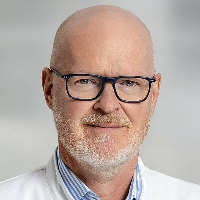

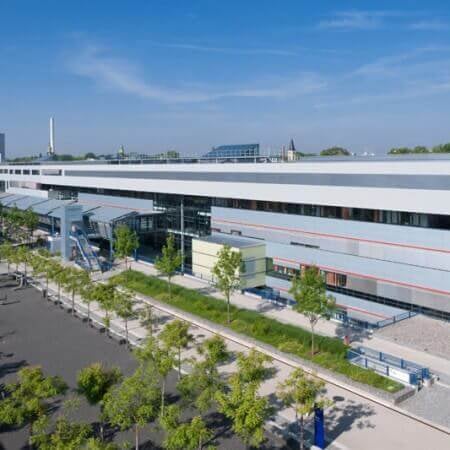
Department of Nuclear Medicine
The Department of Nuclear Medicine offers the full range of diagnostic and therapeutic services in the area of its specialization. Of particular interest are PET/CT, PET/MRI, SPECT/CT, as well as innovative therapeutic methods of nuclear medicine, such as peptide radioreceptor therapy for neuroendocrine tumors, liver tumor radioembolization, and treatment of prostate cancer using radioligands to prostate-specific membrane antigen (PSMA therapy). The department's doctors most often admit patients suffering from cancers, diseases of the nervous and cardiovascular system. The patients receive medical care from the highly qualified internationally renowned specialists with profound clinical training and rich experience. The department's doctors use only reliable radioisotopes, which do not have a harmful effect on the human body and do not cause any side effects. The patients are admitted both on an inpatient and outpatient basis.
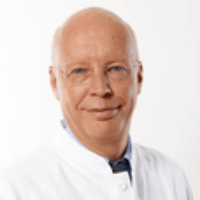


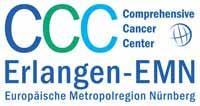
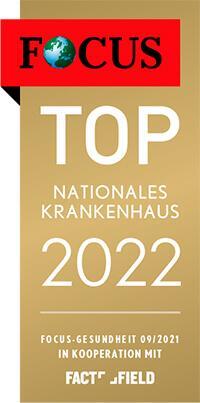
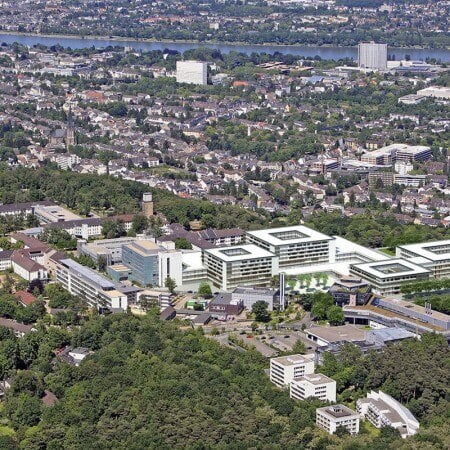
Department of Nuclear Medicine
The Department of Nuclear Medicine offers the full range of radioisotope diagnostics and treatment of various diseases. The department began its work in 1951 and today it is one of the leading and most reputable medical facilities of this kind in Germany. The clinical activities mainly focus on detection and treatment of pathologies of the thyroid gland, heart, lung cancer, breast cancer, prostate gland, liver cancer and metastases, neuroendocrine tumors, malignant melanoma, and brain tumors. The doctors use only reliable, the most effective innovative methods of examination and therapy, which guarantee an optimal result.
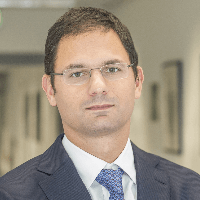



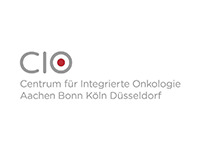
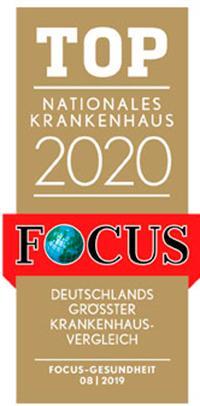
The German Cancer Research Center scientists have developed a biologically active substance PSMA-617, targeted to bind to prostate cancer cells. The biologically active substance is labeled by various radioactive substances. Binding to a weakly emitting diagnostic radionuclide, it will expose prostate tumors and their metastases in PET. Being labeled by a strongly emitting therapeutic radionuclide, PSMA-617 can destroy the cancer cells in a targeted manner. The first clinical use of the radiopharmaceutical was promising.
Prostate carcinoma is the most common cancer among men. An additional anti-hormonal treatment is often prescribed after local therapy (surgery and/or radiation) for advanced prostate cancer. After a prolonged anti-hormonal therapy, the cancer cells frequently become resistant to these medicines, so later, upon tumor progression, chemotherapy often remains the only option. Further treatment options for patients with prostate cancer can be a PSMA-therapy. PSMA (prostate-specific membrane antigen) is a protein propagating on the surface of prostate cancer cells. This allows using the same in radiation diagnostics and therapy of these tumors by combining the substance associated with PSMA with a radioactive nuclide (177 Lu, ß-emitter). For PSMA therapy, the radioactive emission (beta radiation) may exercise a direct therapeutic effect on tumor cells. Being associated with a weakly emitted specific diagnostic radionuclide, PSMA-617 can detect very small aggregates of prostate cancer cells in PET (positron emission tomography) studies.
Upon PSMA radionuclide therapy, the radioactive emission (ß-radiation) may exercise a therapeutic effect directly on the tumor cells while sparing the healthy surrounding tissues. The treatment goal is inhibition/delay of the tumor cell growth while covering the metastases (in bones, soft tissues, and the like). The cost of Lutetium-177 PSMA therapy for prostate cancer is between 22,700 EUR and 44,000 EUR.
Content
- Indications for prostate cancer treatment by lutetium-177 in Germany
- Prostate cancer treatment by lutetium-177 in Germany. Methods and procedure
- Treatment process for prostate cancer with LU-177 in Germany
- Eventual risks and complications in prostate cancer treatment by Lu 177
- Stay in a German hospital
Indications for prostate cancer treatment by lutetium-177 in Germany
Metastatic prostatic carcinoma cells bear on their surface a so-called high-density prostate-specific membrane antigen (PSMA). The ligands binding to PSMA can be radioactively labeled, including radionuclides used for therapeutic purposes, such as 177-lutetium. This type of therapy is feasible for patients with metastatic prostate cancer which are no longer affected by the prior conventional systemic therapy, i.e. chemotherapy. In agreement with the attending urologists/oncologists, especially considering the exclusion of subsequent treatments, such as the second and third cycle of chemotherapy due to the possible low effectiveness, side effects and comorbidities, as well as at the patient's request, the chemotherapy with a high degree of side effects should be avoided.
Prostate cancer treatment by lutetium-177 in Germany. Methods and procedure
In the course of preparation and planning of this treatment, various studies are carried out: blood tests, including a differential blood count, liver and kidney function tests, as well as PSA.
This allows for assessing the risks and side effects to the other organs (e.g., hematopoietic spinal cord) and monitoring from an early treatment stage.
During the preparation for treatment, it is required to conduct a PSMA scintigraphy or PSMA-PET-CT to assess whether the PSMA-therapy is feasible and promising. Besides, conducting a preliminary bone and salivary gland scintigraphy is required. To determine the indications for PSMA, the findings of the other studies and pictures of the previous surveys, e.g., diagnostic computed tomography (CT) or Choline-PET-CT, are useful.
From Colorado to Berlin: American Patient's Success with Lutetium-177 Treatment
Treatment process for prostate cancer with LU-177 in Germany
Lutetium-177-PSMA ligands bind PSMA to cells carrying the prostate cancer on their cell membranes. Due to radioactive rays with a short exposure, cell growth is prevented at a depth of a few millimeters only; they are damaged or destroyed.
PSMA treatment is carried out after a conversation with a clinic department physician on the day the treatment is scheduled. The salivary gland scintigraphy is performed unless conducted on the day before. It is also required to conduct preliminary renal scintigraphy to determine their functions and the kidney outflow ratio.
On the treatment day, you must be sober. The department physician will introduce venous catheters into both of your hands. About 2 hours before the treatment start, we will apply an ice pack to your lower jaw to protect your salivary glands so that they are cooled and thus bled to a lesser extent. This implies a lesser accumulation of radioactive substances in the salivary glands. Before treatment, an injection of saline solution will be administered to protect your kidneys. Following this, a healing radioactive substance is injected. It is introduced with a syringe for about 10-15 seconds. If you have any side effects during or after treatment (e.g., nausea), please, inform the department staff to receive the appropriate drugs to suppress the side effects.
About 15-30 minutes and 2-4 hours after the healing injection, we conduct a general scintigraphy to monitor the activity distribution and measure the radiation load on the kidneys, respectively; simultaneously, a tube of blood is taken to evaluate the radioactive dose in the blood and bone marrow at each sampling. During the hospital stay, the radiation dose rate is determined, and the necessary blood samples are taken.
On the day of discharge, a repeated general scintigraphy of the whole body is carried out to visualize the PSMA distribution (the scintigraphy is performed 24 and 48 hours later, depending on the used nuclide). Once the radioactive radiation emitted by the patient's body is below the regulatory threshold, the patient can be discharged.
In accordance with the Regulations on Radiation Protection, the treatment can be carried out in a hospital setting only, and the patient must stay in the radiotherapy department for four days.
Typically, the hospital stay takes 3 to 4 days.
To estimate the radiation dose received, we appoint your next visit to us for scintigraphy of the whole body and blood sampling 6 to 9 days after treatment. The final scintigraphy is performed about 7 to 10 days after treatment.
The total permitted amount of therapeutic radioactivity is not introduced within a single session. In most cases, the treatment is carried out in several separate cycles, during which you will stay in our department for eight weeks at intervals.
Laboratory monitoring for about 10 weeks, every two weeks, is required in most cases. PSA checks must be carried out 4 and 8 weeks after therapy. Depending on the survey findings and the patient’s overall condition, the PSMA therapy is normally conducted in three cycles.
A repeated PET/CT is performed about a week before the second treatment cycle to evaluate the effectiveness of the preceding treatment cycle. Besides, before each new cycle of therapy, you shall pass the blood count and liver and kidney function tests to detect the eventual deterioration of their condition and the bone marrow status on a timely basis. Please, include the relevant examinations in your schedule.
| Country | Average cost of treatment |
|---|---|
| Germany | 33,310 EUR |
| Turkey | 27,600 EUR |
| Austria | 31,000 EUR |
The best hospitals for metastatic prostate cancer therapy are:
- Helios Hospital Berlin-Buch
- University Hospital Rechts der Isar Munich
- University Hospital of Ludwig Maximilian University of Munich
- University Hospital Frankfurt-am-Main
- University Hospital Carl Gustav Carus Dresden
Eventual risks and complications in prostate cancer treatment by Lu 177
In general, the treatment is well-tolerated. Sometimes, there are side effects, such as nausea and vomiting (medically treatable), taste sensation disorders and xerostomia (partially, temporarily), as well as fatigue. PSMA is excreted by the kidneys, liver and bladder. Therefore, we must pay attention to adequate intestinal activity and stimulate it when required.
Along with this, a sufficient amount of liquid should be consumed. The liver and kidney functions shall be checked after treatment, too. The following organs at risk are the salivary and lacrimal glands, to which PSMA is bound. To minimize the damage to the salivary glands, they are cooled for an extended period, minimizing the risk of long-term damage and loss of gland functions (xerostomia). Besides, it can lead to a temporary change in the blood pattern.
Stay in a German hospital
The Regulations on Radiological Protection require that the patient stays in the radiation medicine ward with a protective screen.
The visitors are not allowed in a shielded area. However, you will be able to receive the essentials from your family through the attendants.
For your stay in the hospital, please, take comfortable casual clothes, nightwear and ordinary personal hygiene products. You should also take the items required for your pastime (e.g., magazines, books, laptop, handicraft items, etc.). They are not "irradiated" during treatment and can be used in everyday life.
The radio, TV and telephone are at your disposal in the wards.
Authors:
The article was edited by medical experts, board-certified doctors Dr. Nadezhda Ivanisova and Dr. Sergey Pashchenko. For the treatment of the conditions referred to in the article, you must consult a doctor; the information in the article is not intended for self-medication!
Sources:

